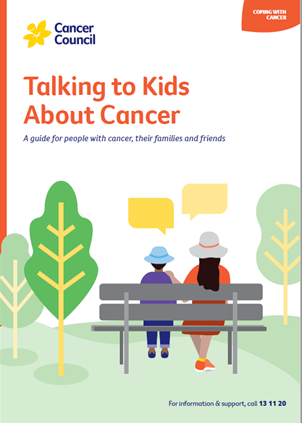- Home
- About Cancer
- Family and friends
- Talking to kids about cancer
- Living with advanced cancer
- Maintaining family life
Maintaining family life
When cancer is advanced and life is even more uncertain, many families find new ways to focus on the things they value most.
Here are some ideas for maximising your time with your family and preparing them for the future:
- Accept offers of help. It not only frees up your time and energy for the family, it also allows friends to feel that they are contributing.
- Make a memory box, choosing keepsakes together. These will be personal choices, but could include: treasured photos; special birthday cards; a favourite cap, tie, scarf or another item of clothing; a list of shared memories; tickets from special outings; a family recipe; a pressed flower from your garden; a bottle of perfume or aftershave; a lock of hair.
- Plan a special outing with your family. You might have always wanted to take your kids to the beach, the ballet or the football grand final. You might want to show your kids where you grew up, or maybe there is somewhere special that your children would like to take you.
- Listen carefully to what your children want to say. Allow your children to express any regrets that they have.
Issues with going to school
| Balancing school and time at home | It can be difficult to know whether to send your children to school each day if you think someone in the family may die soon. You may feel like you need to let them spend as much time as possible with their loved one. |
| Keeping a routine | Maintaining routine in a child’s life can help them to feel more stable and safe. It might help them to go to school and see that normal life can continue, even though things are changing at home. However, there may also be days when keeping your children home feels like the right thing to do. |
| Talking to the school | You may want to talk to your children’s teachers about what is going on at home. It’s helpful for the school to know about any major concerns in a student’s life so they can understand and respond appropriately to any changes in behaviour or academic performance. |
| Talking to your teenager | If you have older children, it’s important to ask them what they want you to do. Teenage children might choose to tell their teachers themselves. They may not want their teachers to know at all because they don’t want the attention or to be thought of as different from the other students. Reassure your teenager that their teacher can help and won’t tell anyone else without their permission. |
→ READ MORE: Finding support and information
Podcast: Explaining Cancer to Kids
Listen to more episodes from our podcast for people affected by cancer
More resources
Prof Jane Turner AM, International Psycho-Oncology Society President Emeritus,The University of Queensland, QLD; Taylor Baker, Consumer; Dr Ben Britton, Principal Clinical and Health Psychologist, Head of Psychology, Hunter New England Mental Health, NSW; Camp Quality; Dr Lisa Cuddeford, Head of Department, WA Paediatric Palliative Care Service, Perth Children’s Hospital, WA; A/Prof Peter Downie, Head, Paediatric Haematology–Oncology and Director, Children’s Cancer Centre, Monash Children’s Hospital, VIC; Dr Sarah Ellis, Clinical Psychologist, Kids Cancer Centre, Sydney Children’s Hospital, NSW; Malia Emberson-Lafoa’i, Consumer; Kate Fernandez, 13 11 20 Consultant, Cancer Council SA; Jane Gillard, Consumer; Mary McGowan OAM, International Childhood Cancer Advocate, VIC; Annette Polizois, Senior Social Worker, Women, Family and Emergency Care Team, Royal North Shore Hospital, NSW; Rhondda Rytmeister, Clinical Psychologist, HeadWayHealth (formerly Snr Clinical Psychologist, The Cancer Centre for Children, Westmead, NSW); Nadine Street, Head of Social Work and Social Welfare, HNE Mental Health Service, NSW; Warren Summers, Online Counsellor, Canteen, NSW.
We would also like to thank the health professionals, consumers, organisations and editorial teams who have worked on previous editions of this title, and we are grateful to the parents and young people whose real-life stories have added to the richness and relevance of this book.
We thank and acknowledge Dr Paula K. Rauch, MD, Founder and Director, Marjorie E. Korff PACT (Parenting At a Challenging Time) Program and Associate Professor of Psychiatry, Harvard Medical School, whose research and writing on helping parents talk to their children about cancer was used as source material for this book and has been adapted in several sections: pages 8–11, How children understand cancer; page 22, Answering key questions: Are you going to die?; page 26, Involving the school or preschool; pages 30–31, Hospital visits; and pages 36–37, Encouraging family time. We also thank the American Cancer Society for permission to use and adapt material on pages 8-11 from its book Cancer in Our Family: Helping children cope with a parent’s illness (2013); Macmillan Cancer Support for permission to use its book Talking to Children and Teenagers When an Adult Has Cancer (2013) as a source of information; Jessica Watt, Oncology Social Worker, The Children’s Hospital at Westmead, for her contribution on page 20, When another child has cancer; and Diane McGeachy, Hobart Counselling Centre, for contributing material for page 37, Spending one-on-one time.
View the Cancer Council NSW editorial policy.
View all publications or call 13 11 20 for free printed copies.

